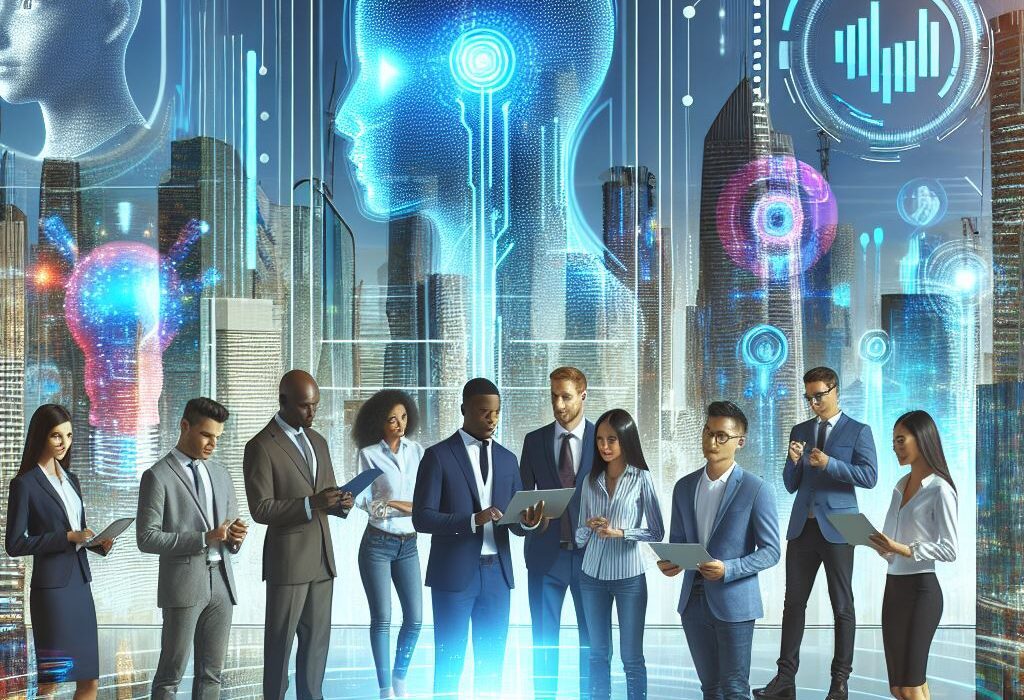Latest AI Trends in 2025: Artificial Intelligence (AI) has been a transformative force across industries, and as we approach 2025, the pace of innovation shows no signs of slowing down. From healthcare to finance, education to entertainment, AI is reshaping the way we live, work, and interact with technology. In this article, we’ll explore the latest AI trends in 2025, providing you with insights into what’s on the horizon and how these advancements could impact your life and business.
1. AI-Powered Personalization
One of the most significant trends in AI for 2025 is the rise of hyper-personalization. AI algorithms are becoming increasingly sophisticated, enabling businesses to deliver highly personalized experiences to their customers. Whether it’s personalized marketing campaigns, tailored product recommendations, or customized content, AI is at the heart of this trend.
For example, e-commerce platforms like Amazon and Netflix are already using AI to recommend products and content based on user behavior. In 2025, we can expect this trend to expand further, with AI-driven personalization becoming the norm across industries. This will not only enhance customer satisfaction but also drive higher conversion rates for businesses.
External Link: How AI is Transforming Personalization in E-commerce
2. AI in Healthcare: Revolutionizing Patient Care
AI is set to revolutionize healthcare in 2025, with advancements in diagnostics, treatment planning, and patient care. AI-powered tools are already being used to analyze medical images, predict patient outcomes, and even assist in surgeries. In the coming years, we can expect AI to play an even more significant role in healthcare, particularly in the areas of personalized medicine and drug discovery.
For instance, AI algorithms can analyze vast amounts of patient data to identify patterns and predict diseases before they manifest. This could lead to earlier interventions and more effective treatments. Additionally, AI is being used to accelerate the drug discovery process, reducing the time and cost associated with bringing new drugs to market.
External Link: The Role of AI in Modern Healthcare
3. Autonomous Vehicles: The Road Ahead
Autonomous vehicles have been a hot topic for several years, and by 2025, we can expect significant advancements in this area. AI is the driving force behind self-driving cars, enabling them to navigate complex environments, make real-time decisions, and improve safety on the roads.
Companies like Tesla, Waymo, and Uber are leading the charge in developing autonomous vehicle technology. In 2025, we may see more widespread adoption of self-driving cars, particularly in urban areas where traffic congestion is a major issue. Additionally, AI-powered autonomous vehicles could revolutionize the logistics and transportation industry, leading to more efficient supply chains and reduced costs.
External Link: The Future of Autonomous Vehicles
4. AI and the Future of Work
The impact of AI on the workforce is a topic of much debate, and by 2025, we can expect to see significant changes in the way we work. AI is already being used to automate repetitive tasks, analyze large datasets, and assist in decision-making. In the coming years, AI could take on even more complex tasks, potentially displacing some jobs while creating new ones.
However, it’s not all doom and gloom. AI has the potential to augment human capabilities, enabling workers to focus on more creative and strategic tasks. For example, AI-powered tools can help marketers analyze customer data, generate insights, and optimize campaigns, allowing them to focus on crafting compelling messages and strategies.
External Link: How AI is Shaping the Future of Work
5. AI in Education: Personalized Learning Experiences
Education is another area where AI is making significant strides. By 2025, we can expect to see more widespread adoption of AI-powered tools in classrooms, enabling personalized learning experiences for students. AI can analyze student performance data to identify areas where they may be struggling and provide tailored recommendations to help them improve.
Additionally, AI-powered virtual tutors and chatbots can provide students with instant feedback and support, making learning more interactive and engaging. This could lead to better educational outcomes and a more personalized approach to education.
External Link: The Role of AI in Education
6. AI in Cybersecurity: Protecting Digital Assets
As our reliance on digital technologies continues to grow, so does the need for robust cybersecurity measures. AI is playing an increasingly important role in cybersecurity, helping organizations detect and respond to threats in real-time. By 2025, we can expect AI-powered cybersecurity tools to become even more sophisticated, enabling organizations to stay one step ahead of cybercriminals.
AI can analyze vast amounts of data to identify patterns and anomalies that may indicate a potential threat. This allows organizations to respond quickly and effectively, minimizing the impact of cyberattacks. Additionally, AI can be used to automate routine cybersecurity tasks, freeing up human resources to focus on more complex issues.
External Link: How AI is Revolutionizing Cybersecurity
7. AI in Entertainment: Creating Immersive Experiences
The entertainment industry is no stranger to technological innovation, and AI is set to play a major role in shaping the future of entertainment. By 2025, we can expect to see more AI-powered tools being used to create immersive experiences for audiences. From AI-generated content to virtual reality (VR) and augmented reality (AR) experiences, the possibilities are endless.
For example, AI can be used to generate realistic characters and environments in video games, creating more immersive and engaging experiences for players. Additionally, AI-powered tools can be used to analyze audience preferences and create personalized content recommendations, enhancing the overall viewing experience.
External Link: The Role of AI in the Future of Entertainment
8. AI in Finance: Transforming the Financial Landscape
The financial industry is undergoing a significant transformation, driven by advancements in AI. By 2025, we can expect to see more widespread adoption of AI-powered tools in areas such as fraud detection, risk management, and customer service. AI can analyze vast amounts of financial data to identify patterns and trends, enabling organizations to make more informed decisions.
For example, AI-powered chatbots can provide customers with instant support, answering questions and resolving issues in real-time. Additionally, AI can be used to detect fraudulent transactions, helping organizations protect their assets and maintain customer trust.
External Link: How AI is Transforming the Financial Industry
9. AI in Agriculture: Feeding the Future
As the global population continues to grow, the demand for food is increasing, putting pressure on the agricultural industry to produce more with less. AI is playing a crucial role in addressing this challenge, enabling farmers to optimize their operations and increase yields. By 2025, we can expect to see more widespread adoption of AI-powered tools in agriculture, from precision farming to crop monitoring.
For example, AI can analyze data from sensors and drones to provide farmers with real-time insights into crop health, soil conditions, and weather patterns. This allows farmers to make more informed decisions, reducing waste and increasing productivity. Additionally, AI can be used to automate routine tasks, such as planting and harvesting, freeing up farmers to focus on more strategic activities.
External Link: The Role of AI in Modern Agriculture
10. AI Ethics and Governance: Navigating the Challenges
As AI continues to advance, it’s essential to address the ethical and governance challenges that come with it. By 2025, we can expect to see more robust frameworks and regulations in place to ensure that AI is used responsibly and ethically. This includes addressing issues such as bias in AI algorithms, data privacy, and the potential impact of AI on jobs and society.
Organizations will need to take a proactive approach to AI ethics, ensuring that their AI systems are transparent, accountable, and fair. This will require collaboration between governments, industry leaders, and researchers to develop best practices and guidelines for the responsible use of AI.
External Link: The Importance of AI Ethics and Governance
Conclusion
The latest AI trends in 2025 promise to bring about significant changes across industries, from healthcare and finance to education and entertainment. As AI continues to evolve, it’s essential to stay informed about these advancements and understand how they could impact your life and business. By embracing AI and staying ahead of the curve, you can position yourself for success in the rapidly changing digital landscape.
As we move closer to 2025, it’s clear that AI will play an increasingly important role in shaping the future. Whether it’s through personalized experiences, improved healthcare, or more efficient supply chains, AI has the potential to transform the way we live and work. By staying informed and embracing these trends, you can ensure that you’re ready for the future of AI.





